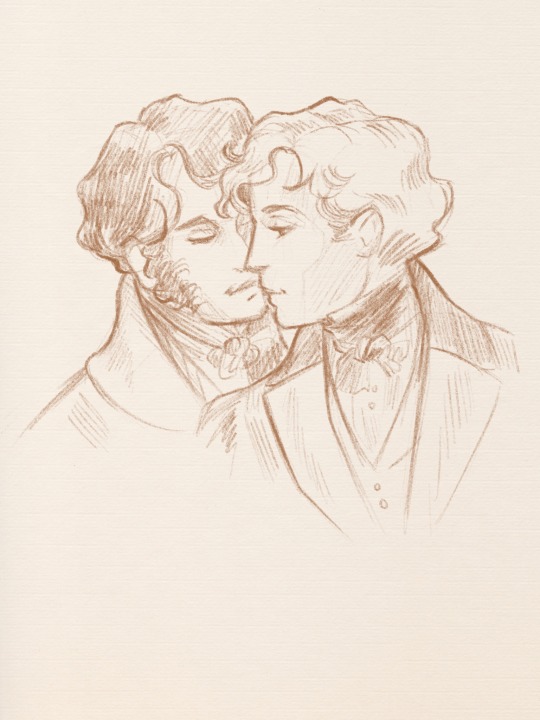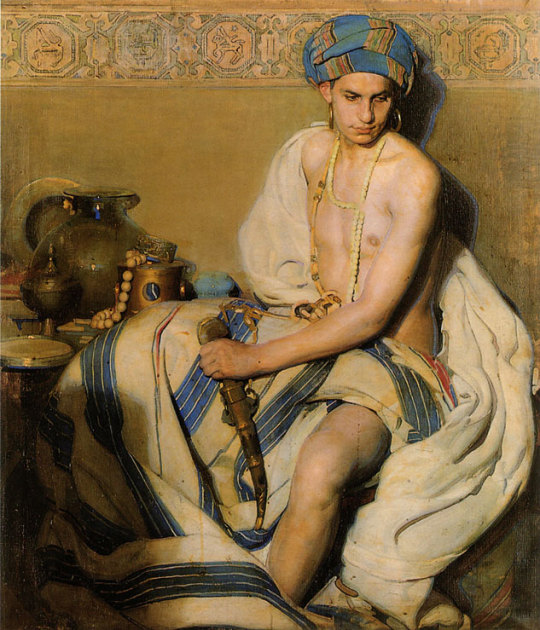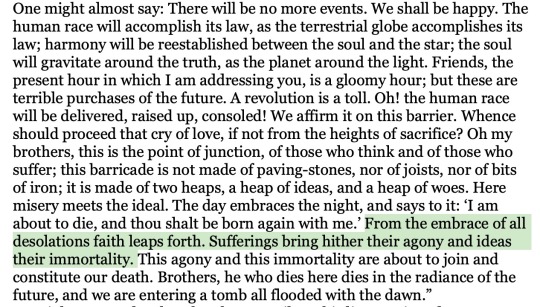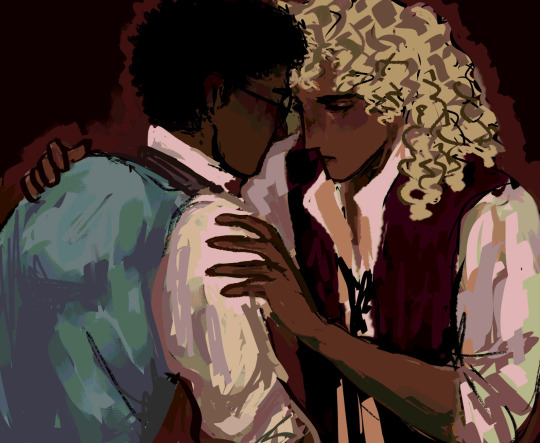#homo and vir
Text


Digital sketching from the past two days
117 notes
·
View notes
Text
ok look i am an e/R girlie (gender neutral) to my bones but the more i consider aroace enj and ace ferre in a queerplatonic relationship.....
#is this a post made moments before disaster (me becoming an enjolferre shipper)?#only time will tell#les mis#homo and vir#mine
9 notes
·
View notes
Text

1912, Gabriel Morcillo Raya, Hombre con turbante
#Gabriel Morcillo Raya#Homo mitratus#Hombre con turbante#saec. XX#1912#pictura#Collectio privata#Homo#Iuvenis#Vir#7W666LI
132 notes
·
View notes
Text


Homo et Vir - for International Women’s Day 2024
It’s for a fandom event which celebrates International Women’s Day. Both Enjolras and Combeferre was me. The content I extracted from the book was what I want to say for this special day.
#les mis#les mierables#enjolras#combeferre#enjolras cosplay#Combeferre cosplay#enjolferre#homo et vir#cosplay
16 notes
·
View notes
Text

homo and vir.
@logic-and-philosophy
#enjolferre#enjolras#combeferre#les mis#les mis fanart#les miserables#logic and philosophy week#v art
149 notes
·
View notes
Text

If it had been granted to these two young men to attain to history, the one would have been the just, the other the wise man. Enjolras was the more virile, Combeferre the more humane. Homo and vir, that was the exact effect of their different shades.
334 notes
·
View notes
Text
yeah they’re cute but does he complete and correct him? does homo and vir express the exact effect of their different shades? would you want to fight under one and march behind the other? if it had been granted to these two young men to make history, would one have been the just, the other the wise man?
135 notes
·
View notes
Note
If you looked into it, the term Salmacian comes from the sex-transforming Salmacis Spring of mythology. This predates the interpretation of the myth wrote by Ovid, that has the rape. Others myths describe Salmacis as a nurse who take care of the infant Hermaphroditus. You can find the reference to the spring on the salmacian website. From salmacian.org: The flag’s central emblem, the “Sign of Salmacis”, consists of a lowercase sigma for “salmacian”, with waves to represent the sex-transforming Salmacis Spring of mythology.
okay so. unfortunately i read ancient greek and latin and spent quite a bit of time a couple years ago reading everything i could about hermaphroditus. normally i wouldn't bother to continue this conversation but i just got way too into relooking over old translations lmfao. putting this under the cut because it's too long. but long story short for followers who don't want to read the whole thing is that i think this is a really bad faith response that misrepresents the myths and fails to understand the reason why this term feels particularly insensitive to intersex people.
yes, there were other myths before Ovid, and the Salmacis spring was thought to have powers before he wrote the Metamorphoses. the Greek transcription at the spring from 2 B.C.E is a part of a larger poem that's answering the question "What is so honored about Halicarnussus?", and this version of the myth has Salmacis raising Hermaphroditus as a child and then marrying him. there's some really interesting analysis done there, actually, looking at how the the Hermaphroditus & Salmacis story is inserted into this larger epigraph that is largely about colonization, and connecting the promotion of marriage in that version of the myth as a function of propaganda around "civilized" values.
I also would almost hesitate to label the spring as "sex transforming," in the earliest conceptions of this myth--most of the earliest literature says that the water will turn people mollis, impudicus, obscenus, and μαλακός, all of which are words that are being used in a mostly derogatory fashion and could be translated similar to "effeminate" and have sexual, specifically gay undertones. the powers of the spring are more interpreted as making people gay (and specifically in some contexts, making people a bottom), rather than necessarily transforming sex as we think about it today.
Ovid's version of the myth, written in Metamorphoses 4, is the more popular and widespread version of the myth. The sex transforming powers of the spring cannot be separated from the violent rape in this myth: the reason the spring is thought to have sex transforming powers is because Hermaphroditus asked his parents to make everyone who bathed in the spring "half a man (semivir)" like him:
Ergo ubi se liquidas, quo vir descenderat, undas 380
semimarem fecisse videt mollitaque in illis
membra, manus tendens, sed iam non voce virili
Hermaphroditus ait: "nato date munera vestro,
et pater et genetrix, amborum nomen habenti:
quisquis in hos fontes vir venerit, exeat inde 385
semivir et tactis subito mollescat in undis!"
motus uterque parens nati rata verba biformis
fecit et incesto fontem medicamine tinxit.'
i think it is a more fair reading here to say that the spring has sex transforming powers-- I've made the argument before in regards to some other translations that there are some instances where "intersex" might be an appropriate translation of "semivir" (mostly alongside the context of castrati and analyzing how castration narratives are sometimes intersex narratives in Latin, but that's not really the point.) The spring gets powers by the request of Hermaphroditus, and this passage is often translated as a curse from Hermaphroditus to demonstrate his anger at the rape and subsequent merge of bodies. It is much more explicit in this version that this is about transformation of biological sex, although it can still also carry connotations about homosexuality, effeminacy, etc.
anyway. when were are analyzing greek and roman myths, i really don't think it is useful to pretend like there is just one version of the myth, or act like the first version of the myth to get written down is the "correct" version of the myth. engaging with greek and roman myths requires us to engage with multiple and conflicting myths, and isn't just about analyzing the content--it is also about analyzing the author, the audience, the purpose, and the cultural context it is written in. I think that it can be helpful to compare and contrast different versions, understand why priorities differ between generations, what that says about what values people wanted to represent, the sociopolitical context it's written in, etc. and i think that in the context of creating terminology to be used and understood by a modern audience, we also need to consider the context by which myths are read and interpreted currently--what myths people would be familiar with, what myths people would find if they googled, what greek and latin language signifies to people, and what values about sex and gender are present in our current cultural context.
what message does it tell intersex people when the language you use is intimately intertwined with a myth that includes violent rape of an intersex person? what message does it send to intersex people when this myth is directly connected to how we are still understood by society, and the slurs that people use to describe us?
the term "salmacian" is directly engaging with the Salmacis myths, which means that it is engaging with Ovid's Salmacis myth--you google Salmacis and you are going to see Ovid's version alongside others. and i think that anchoring this term in this Greek mythology in the first place has placed salmacian in dialogue with the word hermaphrodite. Which is also one of my complaints with the term, honestly, because the nuances of hermaphrodite as a slur that we sometimes reclaim is not comparable to the dyadic experience with salmacian.
when you use the term salmacian and use it as a reference to greek myth, you are symbolizing a collection of myths that includes a story about a violent rape of an intersex person, and then taking the name of their rapist. as a dyadic person you might feel able to ignore that and pick the versions of the myth you like best. as an intersex person i do not feel able to do that, especially when so much of our community activism is tied to our sexual trauma. especially when the term hermaphrodite carries such a painful history with it, and those myths are where that came from.
anyway. again. like i said in the beginning this is not a term used widely enough for me to feel like it is that important and i don't generally go through life doing in depth analysis of every word that i see lmfao. but if you're going to bring mythology into this dialogue then i will delve into it, because i think it's worth understanding the societal space that hermaphrodite takes up and the reasons why intersex people might feel incredibly uncomfortable with the word salmacian, regardless of which myths you personally like better.
#intersexism tw#h slur tw#like normally i would not write out this much for a bad faith ask but unfortunately i did sort of hyperfixate on this myth lol#and i have a lot of opinions about different translations of it#actuallyintersex#rape tw#salmacian
28 notes
·
View notes
Text
Hey. Hey you. C’mere! I have something wonderful to tell you about the language of Latin, and specifically how it was taught in the Cambridge Elevate Latin textbook.
Ready?
Ok so in Latin, the diminutive of any word ends in -ulus. Basically it just adds the word “little” behind the noun. Best example of this? “homo” means “man/person” (the species, not the gender, that’s “vir”) in Latin. “homunculus” means “little man” in Latin. Which is just a wonderful fact in and of itself. Like c’mon that’s so fun to say. You’re a homunculus. no YOU’RE a homunculus. everyone here is a homunculus. homunculus homunculus homunculus.
But that’s not the best part. Not by a long shot.
So, it’s kinda hard to teach a dead language. You can’t do a lot of conversational skills and learning, because there aren’t a ton of sources to explain how the language was spoken casually. Now, you could just make them read all the super famous Latin texts we have, but those do have a pretty high level of advancement and also happen to be about as exciting to your average high schooler as “explain your answer” math problems.
So, what is a classics course that wants to make absolutely stupendous amounts of money to do??
Well, if you’re the Cambridge Elevate Latin Course, you create one long storyline over the course of four books which goes from “astonishingly heart wrenching familial tragedy” to “surprisingly xenophobic narrative of life on the streets of Alexandria” to “extremely out-of-pocket political intrigue” to “telenovela” faster than you can say “Sed Caecilius non respondit”. None of these stories are particularly well written, but they are much more intense than you would expect of a language textbook for middle and high schoolers.
anyway, cut to my 10th grade Latin class, right as we were beginning the “political intrigue but everyone is a complete dumbass” section of the course. And one of the grammar concepts for that stage was diminutives. As I hope I’ve already established, the storyline was completely fucking batshit insane. We were used to it. We could handle absurdity, my class could. We reveled in it. So there we were, reading about the British chieftain A who crashed the king’s dinner party with a *partially* tamed bear, in order to kill/maim/severely embarrass British chieftain B, because B had had the audacity to beat A in a boat race. In my opinion, we were taking it with relatively straight faces, all things considered.
But when British Chieftain B called A “homunculus”?
We lost it. We completely, absolutely LOST. IT. It was one of the best moments of my life.
Anyway, my teacher is switching her freshmen onto a different textbook next year, for SOME REASON, which I frankly think is pretty swagless of her.
#also there is this historically documented dude named Gaius Salvius Liberalis#who they just turned into like. the devil incarnate.#FOR NO REASON#we don't know anything about this dude#but not a day in the textbook goes by without him trying to kill somebody it's insane#anyway#this has been#"Unnecessarily Long Tangents With iampresent#tune in next time for#Myropnous#the short king#clc#cambridge latin course
41 notes
·
View notes
Text
Homo novus. Sic, ambulabo andronem et vidi, vir novus, parvus, imminens apparitus est hodie. Cum Iuliane discutabam et mihi confessus est his puerum suspectum collegam nostram cras fore. Atqui decidi eum venustum esse. Visus est tenuissimus et reverentissimus, sed mysteriosus atque speciosus, eum amavi - crudissime. Se miraturus esse volui omnem rem facere.
Proxime die: "Cubitum eamus" - aio. Hic puer vertit. Oculi stellis simili, bruneti crines... Dicam faciem suam imaginem phantasma fuisse. Non ipsum videbam postmodo. Somno caso, meum congressum cum eo finxi et cogitavi quem spectavissem.
17 notes
·
View notes
Text

Just a little sketch. Happy Belated Valentines!
60 notes
·
View notes
Text

1835-1836, Hippolyte-Jean Flandrin, Jeune homme nu assis sur le bord de la mer
#Hippolytus Flandrin#Hippolyte Flandrin#Iuvenis nudus sedens apud mare#Jeune homme nu assis sur le bord de la mer#saec. XIX#1835#1836#pictura#Musée du Louvre#Parisii#Homo#Iuvenis#Vir#6GPC7FB
57 notes
·
View notes
Text
Costruttore di mondi

“Costruttore di mondi”, ma alla condizione che tu sia “Nessuno”.
Dove c’è la “massa” non ci sono volontà elevate e virtù. (La virtù è la disposizione spirituale conforme alla volontà degli Dei, che si reifica nel vivere secondo Tradizione.) L’arbitrio della massa è fattore endemico del sistema democratico: democrazia è necessariamente demagogia.
La razza umana è degradata: non si conosce più la Patria; non si conosce più il proprio consanguineo; non si ha il coraggio più di punire con la morte il figlio per alto tradimento (oh Bruto se potessi essere ancora un esempio fra noi “homo” e non “vir”); non si è più audaci; non si ha più il desiderio di intraprendere nobili imprese e di primeggiare (non per creare disutili invidie tra gli altri popoli, ma per onorare i propri antenati e divinità); non si ripudia l’umiltà d’animo e il pietismo verso i deboli.
I pochi uomini pensanti o sono spenti nella volontà di reagire, o hanno solo una conoscenza accademica da esibire ai propri colleghi e studenti o svendono la loro dignità in cambio di una estemporanea fama, necessariamente rinnovabile in base ai flussi dei libracci pubblicati, saturi di un becero (se non falso) intellettualismo compatibile con i vizi generali del momento.
La virtù è diventata questione di “altri mondi”. Se vuoi cerca il “Nulla”; diventa finalmente Nessuno; sii così un Costruttore di mondi.
(01/09/2022, 3:13)
#moga alexandru#pensieri#pensieri tumblr#the slumber king#frasi#tradizione#tradizionalismo#Mondi#nuovi mondi#virtù#divinità#dei#potere#democrazia#Bruto#antica roma#volontà
3 notes
·
View notes
Text
LE PAYS DANS LE CIEL
France Culture
La parole à des homos gauchos
Le rose a ses radicaux
Années 60
Après la mort de Jean Cocteau
Alliance avec les premières féministes
Critique du vir masculiniste
But a bad Lord Spirit British
Soi-disant trotskyste
Pote avec les révisionnistes
Isole Louis Aragon
Les Yeux d'Elsa les nazis les ont
Heureusement des prostituées
Leurs corps savent parler
Et puis en 1980 début 1981
Tout le monde est bercé
Par le tube planétaire
De Robert Palmer
Johnny and Mary
Ce qui permet dans le cosmique Dieu et Marie
Tolérance par rapport aux homos
L'interdit pour l'espace Poésie étant facho
Jeudi 9 mai 2024
0 notes
Text

"Le cas le plus typique et le mieux connu [de la décadence linguistique] est peut-être le mot virtus. 'Vertu' dans un sens moderne n'a presque rien à voir avec l'antique virtus. Virtus signifiait la force d'esprit, le courage, la prouesse, la constance virile. C'était lié à vir, un terme décrivant l'homme au sens strict - non dans le sens génétique et naturaliste.
C'est-à-dire, le mot latin vir indique l'homme dans le sens spécifique et genré de la masculinité, plutôt que 'l'être humain' en général, qui était représenté par le mot latin homo.
Dans les langues modernes, ce même mot a au contraire acquis une signification essentiellement moraliste, très souvent associée à des préjugés sexuels, au point que Vilfredo Pareto a inventé le terme 'virtuisme' en référence à cela, pour décrire la morale puritaine et sexophobe bourgeoise. Ce que l'on entend généralement aujourd'hui par une 'personne vertueuse' est quelque chose de très différent des expressions comme vir virtute praeditus [un homme doté de vertu], avec leur réitération très efficace. Et cette différence se transforme fréquemment en une sorte d'antithèse. En effet, un esprit ferme, fier, intrépide et héroïque est l'opposé d'une personne 'vertueuse' dans le sens moderne, moraliste et conformiste.
La signification de virtus comme une force efficace n'a été préservée que dans certaines expressions modernes : les 'vertus' d'une plante ou d'un médicament, 'en vertu' de ceci ou cela."
Evola, La décadence des mots
0 notes
Text
Early modern English pretended to include women through male generic words (like the universal "man") but excluded women by gendering examples, metaphors, and experiences in masculine ways. Dorothy L. Sayers explains it this way: "Vir is male and Femina is female; but Homo is male and female." The problem is that "Man is always dealt with as both Homo and Vir, but Woman only as Femina."
Beth Allison Barr, from The Making of Biblical Womanhood
0 notes